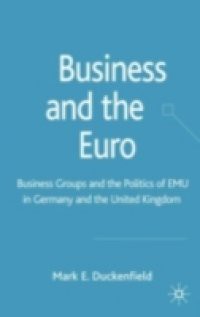In this timely publication, Mark E. Duckenfield examines the attitudes and activities of business associations in Germany and the United Kingdom towards the single European currency in the 1980s. This work challenges standard theories of comparative and international political economy and argues that businesses follow, rather than lead, public debates on important macroeconomic issues such as monetary union. Drawing upon extensive archival research, interviews with policy makers and the leaders of business associations, he makes the provocative argument that business associations are not mere transmission belts for their members' economic interests, rather, they are political entities in their own right. Consequently they act strategically in order to promote their members specific interests and are particularly attentive to the configuration of partisan political forces in their national legislatures. These arguments are developed through a comparison of the politics of EMU in the German Bundestag, the British Parliament and among business associations in both countries.

